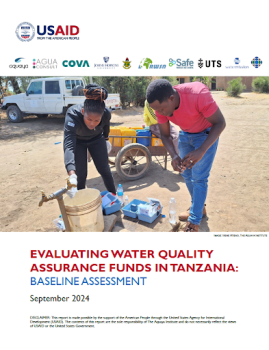Samba Slots brings carnival fun to cash app casinos.
In rural Africa, an estimated two-thirds or more of the population is exposed to contaminated drinking water (UNICEF/WHO 2022). Monitoring water quality is essential to providing safe water and protecting public health, yet many rural water suppliers fail to conduct water quality tests regularly. Using an existing centralized laboratory for analysis may be a cost-effective option for expanding testing for many rural water suppliers, but these laboratories may be unwilling to work with rural suppliers due to non-payment risks. The Water Quality Assurance Fund is an innovative program with a financial mechanism developed to address these issues and encourage water quality monitoring in rural areas of Ghana, Kenya, Tanzania, and similar countries.
The evaluation of the Assurance Fund in Tanzania involves a lean assessment of the program in the five community-based water supply organizations (CBWSOs) enrolled. This report, developed by USAID REAL-Water, summarizes baseline data collected before the launch of the one-and-a-half-year Assurance Fund implementation model and comprises the first step of its impact evaluation.
The baseline results identified several areas of improvement in water safety management that the Water Quality Assurance Fund program may address:
- Water Treatment: All water samples had chlorine concentrations below the recommended level of at least 0.2 mg/L of free chlorine residual, which is inadequate to prevent recontamination during transport and storage. Microbial water quality was frequently poor at the point of collection, with 75 percent of standpipe samples containing detectable E. coli in 100 ml water samples. These findings suggest that providing water operators with monthly water quality test results and technical guidance on corrective actions could encourage them to enhance their water treatment practices. We hypothesize that these activities will lead to increased chlorine residual levels and a reduction in E. coli presence at standpipes.
- Water Quality Knowledge: Water system operators had some knowledge of contamination sources and factors that ensure water safety, such as chlorination. However, their understanding of different types of contaminants and regulations or standards related to water quality was limited. These findings suggest that monthly water quality testing and debrief meetings could enhance the knowledge of water system operators and decision-makers. We hypothesize that better knowledge could lead to improved water treatment, system management, and source protection practices.
- Communication and Consumer Perceptions: Water providers rarely shared water quality information with communities. Increased community engagement activities could enhance awareness among members regarding water quality testing, treatment procedures, and safety standards. We hypothesize that water systems could improve consumer satisfaction with sufficient engagement about water safety management.
Assurance Fund implementation began in Tanzania in August 2024 and is currently ongoing. We are concurrently tracking implementation activities, water system payments, and any unexpected outcomes as part of a process evaluation. Data collection on impact indicators will take place every six months through early 2026.

